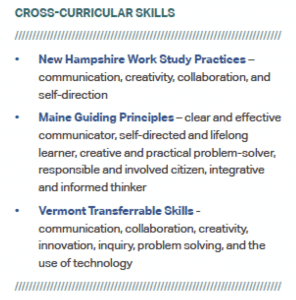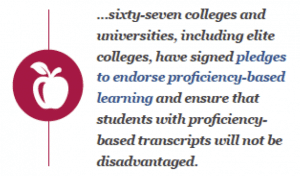Putting the Pieces Together to Build a Competency-Based Statewide System
CompetencyWorks Blog
This is the eighth post in the series Reaching the Tipping Point: Insights on Advancing Competency Education in New England.
New England states have a variety of reasons for turning to competency-based education: higher expectations than ever before, the demand for skills that prepare students for an ever-changing world, and an understanding that the traditional system has become a stumbling block to the future of their children and the strength of their communities.
Below are a few highlights of the statewide system-building efforts that are taking place in New England.
- Proficiency-Based Diplomas
 The proficiency-based diploma policies developed in Maine, New Hampshire, Rhode Island and Vermont appear to be high-leverage in terms of engaging 100 percent of districts; however, the diploma policies cannot stand alone.
The proficiency-based diploma policies developed in Maine, New Hampshire, Rhode Island and Vermont appear to be high-leverage in terms of engaging 100 percent of districts; however, the diploma policies cannot stand alone.
One of the variations across states is the number and types of domains that are included in the diploma policy. Maine has specified that students must demonstrate proficiency within eight domains, while Vermont and Rhode Island only require six. All states have included set state-level cross-curricular skills and offered resources to districts to help them develop a structure and build capacity. (For more on proficiency-based diplomas, stay tuned for the next blog in this series.)
- Calibration
How can parents be confident that their children are making progress and becoming proficient in all the skills they will need to graduate ready for college and careers?
What needs to be in place within the system itself so that students, parents, college admissions, and employers can have full confidence in the diploma?
These are the types of questions that must be addressed in redesigning the education system. As discussed previously, one of the most important elements needed to create a competency-based system is to create mechanisms that can calibrate (also referred to as moderation or tuning) what it means to be proficient for specific standards and competencies and at specific performance levels. If teachers, schools, districts, and states do not have a shared understanding of what it means to be proficient, then variability and inconsistency will continue to corrode the reliability of schools and undermine efforts to eliminate the achievement gap.
- New Models of State-Driven Accountability
Competency education seeks to embed accountability into the district and school levels through transparency, calibration, just-in-time support, and continuous improvement. The goal is to create a system that carefully monitors progress, ensures reliability in determining proficiency, and responds quickly to student needs.
All of New England states with comprehensive approaches to competency-based education have moved away from blaming and shaming schools and educators toward strategies of engagement and support.
- Aligning Professional Development with the Demands of Personalized, Competency-Based Education
 As competency education gains steam in the world of higher education, there is much discussion about creating more personalized, competency-based teacher preparation programs. Obviously, learning in a competency-based education program will help teachers to understand the new approaches; however, more is needed. Programs will need to prepare teachers for creating the cultures and routines for managing a personalized classroom, deeper knowledge of the learning progressions in academic domains, and coaching students in building the habits of work and cross-curricular skills.
As competency education gains steam in the world of higher education, there is much discussion about creating more personalized, competency-based teacher preparation programs. Obviously, learning in a competency-based education program will help teachers to understand the new approaches; however, more is needed. Programs will need to prepare teachers for creating the cultures and routines for managing a personalized classroom, deeper knowledge of the learning progressions in academic domains, and coaching students in building the habits of work and cross-curricular skills.
- Building Bridges with Higher Education
The New England Secondary School Consortium (NESSC) has proven catalytic over the past years in addressing the concerns of graduating seniors and their parents regarding proficiency-based transcripts within the college admissions process. In 2016, NESCC met with the New England Board of Higher Education (NEBHE) and hosted a convening of admissions professionals from selective colleges and universities to look further at implications of proficiency-based learning. According to the report How Selective Colleges and Universities Evaluate Proficiency-Based High School Transcripts: Insights for Students and Schools in the New England Journal of Higher Education, the findings were: “Overwhelmingly, these admissions leaders indicate that students with proficiency-based transcripts will not be disadvantaged in the highly selective admissions process. Moreover, according to some admissions leaders, features of the proficiency-based transcript model shared with the group provide important information for institutions seeking not just high-performing academics, but engaged, lifelong learners.”
The introduction of competency-based education in institutions of higher education is also allowing new possibilities for creating a competency-based pipeline for students. The most promising example to date is in Presque Isle Maine, where the University of Maine’s campus is transitioning to a proficiency-based model that is very similar to the approach of the surrounding districts. In addition, Southern New Hampshire University’s College for America is exploring partnerships with districts and schools across the region. For example, students at Our Piece of the Pie® Academy in Hartford, Connecticut will be able to take advantage of competency-based dual enrollment courses at College for America, thereby opening the door to accelerated pathways from high school to a post-secondary certificate or degree.
For more information about transitioning to competency education in your state, download the full report.
Read the Entire Series:
Post #1 – Reaching the Tipping Point: Insights on Advancing Competency Education in New England
Post #2 – The Every Student Succeeds Act: A Catalyst for Competency Education at Scale?
Post #3 – Five Drivers of Transformation in New England States
Post #4 – The Trouble with Prescriptive Policies When Paradigms are Shifting
Post #5 – A Timeline of K-12 Competency-Based Education Across New England States
Post #6 – Three Lessons Learned from New England States Transitioning to Competency-Based Education
Post #7 – Seven Key Questions for States Looking to Transition to Competency Education